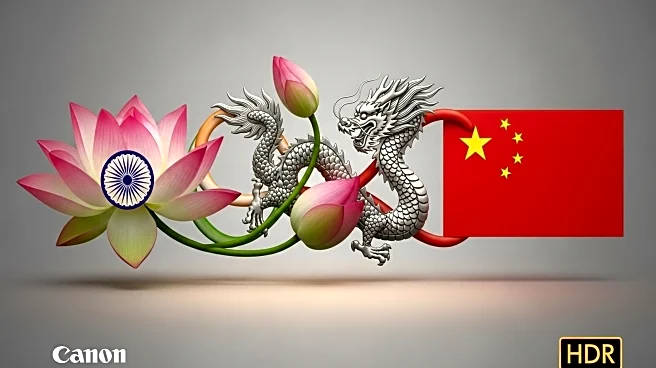What is the story about?
What's Happening?
Indian Prime Minister Narendra Modi and Chinese President Xi Jinping have met in Tianjin to discuss strengthening bilateral relations amidst economic pressures from the United States. The meeting comes after President Trump imposed 50% tariffs on Indian imports, citing India's continued purchase of Russian oil as the reason. This has led India to explore alternative partnerships, including with China, the world's second-largest economy. The leaders pledged to work through their differences for the benefit of their combined population of 2.8 billion people. The meeting resulted in the resumption of direct flights and simplified visa processes between the two nations. However, significant challenges remain, including border disputes and a substantial trade deficit with China.
Why It's Important?
The diplomatic engagement between India and China is significant as it reflects shifting alliances in response to U.S. economic policies. The tariffs imposed by President Trump have strained India-U.S. relations, prompting India to seek closer ties with China. This move could alter geopolitical dynamics, especially in the Indo-Pacific region, where India is part of the Quad alliance with Japan, Australia, and the U.S., which is seen as a counterbalance to China's influence. The outcome of these diplomatic efforts could impact global trade patterns and influence India's strategic autonomy in international relations.
What's Next?
India is set to host the Quad summit later this year, which could test the renewed synergy between India and China, especially if President Trump attends and comments on China. Additionally, ongoing talks between India and China regarding border issues could lead to further diplomatic developments. India's approach to balancing its relations with both the U.S. and China will be crucial in shaping its foreign policy and economic strategies in the coming months.
Beyond the Headlines
The India-China engagement highlights broader implications for global trade and diplomacy. As India navigates its strategic autonomy, it faces the challenge of maintaining its economic ties with the U.S. while exploring new partnerships with China. This balancing act could influence India's role in multilateral forums and its position in global economic and political landscapes.















